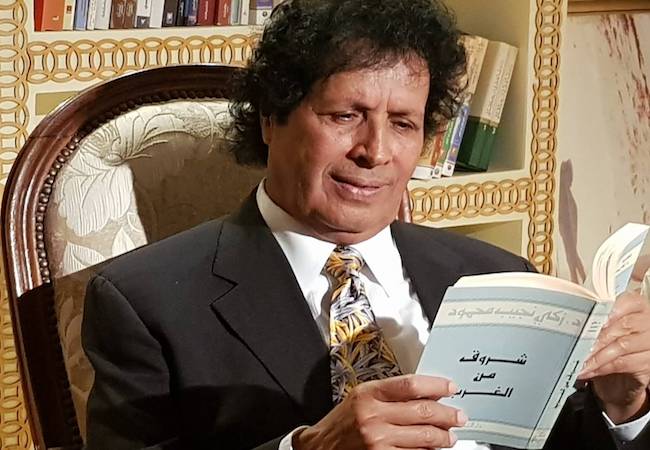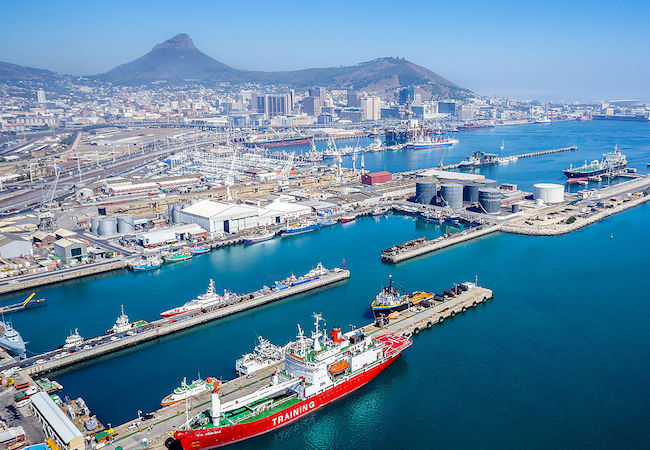Libya’s present and future: Exclusive interview with Professor Ahmed Gaddaf Al-Dam (Addam)

Professor Ahmed Gaddaf Al-Dam (Addam) is currently one of the representatives of the Libyan Struggle Liberation Front, a political movement comprised of diverse members of the former Gaddafi government, and from various Libyan tribes and parts of the country. It is ideologically aligned with the Eastern Libya-based House of Representatives, and seeks a peaceful political reconciliation in Libya, eschewing external interventionism by Turkey, Qatar, and other states and entities which have lended mlitary and financial assistance to the Government of National Accord (GNA). Professor Gaddaf Addam was Muammar Gaddafi’s cousin, a special envoy, and a veteran diplomat. In the past he was Libya’s ambasssador to Saudi Arabia, and managed the Libyan-Egyptian relations, after starting out as an officer under Gaddafi. His father was one of the leaders of the Liberation Army, which came in from Egypt to liberate Libya in 1942.
Professord Addam, in an exclusive interview, discussed the current situation in Libya, the prospects for the future, and the role of other countries in exacerbating the ongoing crisis. Asked about the historic relationship with Qatar, Professor Addam explained that Libya and Qatar once enjoyed a good relationship, and considered Qataris fellows and brothers. “We ued to look at them as a new blood and a new spirit infused into the Arabian Peninsula”, he said, adding that the Qataris presented themselves as progressive, innovative, and leaders of moving the Arab world in a new direction to Muammar Gaddafi. However, he explained, Qatar’s policy was deceptive; despite the talk of ideals, their ideology was self interest at the expense of others.
They were actively trying to fuel the fire of extremism, worsened and exacerbated tensions and enmity among countries and nations, and created discord. Recently leaked recordings obtained from various ex-Qatari and Saudi sources, reveal once-secret recordings in which Qatar’s former Emir Hamad, in a meeting with Muammar Gaddafi, revealed various plans to undermine Saudi Arabia by trying to assassinate then-Crown Prince Abdullah, splitting the Kingdom into two smaller countries, to Qatar’s benefit, and sponsoring Saudi opposition inside and outside the country. Emir Hamad, it is now being said, was trying to take advantage of Muammar Gaddafi’s misunderstanding with the Saudis, and used the meeting as an opportunity to try to gain Libya’s support for this plan to undermine the Kingdom’s influence in the Arab world.
“In 2011, their true face showed when they aligned themselves to the NATO, which is something we have not expected and that is aiding other forces other than our own.” – summed up Professor Addam. In 2011, NATO’s military intervention in Libya to implement an UN resolution led to Muammar Gaddafi’s bloody overthrow and grizzly death, spiraling the country into a messy fractured conflict, that continues to this day. Even critics of Gaddafi’s policies in the MENA region saw the intervention as unnecessary, and perceived it as an unwelcome Western led interventionism, viewing the Western countries as siding with the Arab spring protests.
These protests and the outcome was unfavorable compared to the overthrow of Saddam Hussein in Iraq, a development that was across the board seen as poorly planned and that gave an opening for Iran’s regional aggression to spread across the Middle East starting with subsuming Iraq. The intervention in Libya, too, was seen as feeding int the narrative of the Islamists and emboldening extremists and terrorists. In short, far from being a responsive seen to universal concern about Gaddafi’s alliances with terrorists and the corruption of his government, these events were seen as at best idealistic meddling at the region, at worst cynical manipulation aimed at destabilizing the Arab world and throwing it to the mercy of the Muslim Brotherhood and Al Qaeda.
To understand the growing distrust of Western interests by the Arab nations (and not just governments), it is important to understand that NATO involvement in Libya was not seen as benevolent and liberating, but rather as unnecessary, burdensome, and thoughtess. It is no coincidence, to most of the Arab observers, that Qatar backed this intervention, despite generally being opposed to the NATO priorities, as Doha was playing a central role in shaping the narratives about the Arab Spring that would empower Islamists and that were seen at odds with the roles of traditional governments.
That also means, that whatever the worth of Gaddafi-Emir Hamad recordings, by 2011, Gaddafi was sufficiently frightened by the fate of Saddam Hussein that he was willing to play ball with the United States as well as with the Saudis, and was not perceived as a more significant threat than the Muslim Brotherhood, but at the very least, the less of the evils. Whether or not Gaddafi was genuinely interested in Hamad’s visions for the region, or was merely keeping the recordings around as insurance policy or blackmail material is yet to be determined, but that the Qatari move against him was seen as a shocking betrayal n ot just by Gaddafi himself but by the rest of the Arab world is now confirmed by Professor Addam.
Commenting on Libya’s relationship wit Egypt, Professor Addam explained: ” Our relationship with Egypt is based on the understanding that this nation needs a makeover to the image of Germany. And so, ever since the days of the Leader, Abdul Nassir, and Al-Fateh’s revolution, we have worked on uniting ourselves politically, economically, and socially.” Underscoring that more than 15 million individuals of Libyan descent live in Egypt, Professor Addam explained that the relationship with Egypt was very close until in 2011, the Arab Spring brought down the Mubarak government, replacing it with the short-termed Muslim Brotherhood Mohammed Morsi regime.
Furthermore, the effect of the uprisings was to open up the borders to a flow of weapons and a stream of extremist groups’ the events in Egypt spread to Eastern Libya, igniting extremism; despite the destructive turn these events took, they enjoyed the support of the Western world, which either thought the violent revolution in Libya would somehow bring about a liberal democracy, or, on the contrary believed that the Islamists in power would be more popular with the regular people and easier to deal with. The Obama administration believed that “moderate” Islamists following the political path would control their violent ideological counterparts. “They have wreaked havoc, caused death and weapons propagation in the hands of children. There was even a media-backed campaign to affect morale in the FM radio channels. Upon the death of Al-Qadhafi, the situation turned upside down and Libya transformed into a land of terror, weapons trading, bombings, and automated traps everywhere. Missiles were launched into Sinai and Egyptian youth were recruited in Libya to be used in terrorist operations.” – laments Professor Addam. But has the West learned the lessons from those politically naive days?
There is little evidence that the official foreign policy of the United States, United Kingdom, France, Germany or other NATO members is currently in any way oriented towards liberalization, democracy building, or state modeling. However, the United States continues working to preserve alliances with state actors, such as Turkey and Qatar, which have been contributing towards the empowerment of Islamist elements in Libya and elsewhere in the region, this time without the pretense of taking part in a politically democratic process, nor the expenditures of the populist media coverage smokescreen.Instead, the expenses of the new power struggling are geared towards lobbyists working to sway analysts and policy makers, rather than the general public hearts and minds, in DC. Foreign policy may be back in the hands of the elites, but the substance of the processes on the grounds has not changed, and the same religious and political extremism is now spreading via GNA-backed militias in an open power grab rather than a pretense of a a grassroots movements, which in the past, would resonate more with the academia, and human rights activists.
But how is Professor Addam’s own political movement, the Libyan National Struggle Front, dealing with these open-ended and ongong political challenges, so deeply rooted in the events of the recent past? “The Libyan National Struggle Front was established at the hands of influential, sensible Libyans who are well aware of the magnitude of the plotting done against our country, the envy displayed towards it and the desire to usurp any pacifist movement.
The Front urges to forget the past and take down the illusion that is the new state, which is unstable, unpopular, has wasted precious resources and delivered the country right into the hands of gangs and terrorists.
The Libyan citizen has resorted to beggary, they have been humiliated and dispersed all over the globe, and even in prisons full of hostages. Torture and death have become readily available on our TV screens, night, and day.” – explains Professor Gaddafi, urging, nevertheless, to strive for unity. “hus, it has become a necessity for us to cooperate with the good citizens of Libya and other countries to put a stop to this crude joke and save the state, as well as end the conflict.
We have instated cease-fire policies and have come far with a dialogue that appeals to the crushing but silent majority abroad. We have proposed a solution that invites the Libyans to support a new state, a general pardon and a united country that does not come from beyond the seas. We have called to the unification of the military institution, the police and the security forces.
We have called to the forming of a council that unites the Sheikhs of every tribe and urged them to cooperate with the United States in their efforts to round up the weapons, liberate the prisoners and the return of the refugees. That based on science and a political system that will follow fair elections.”
Indeed, what he is describing is a version of a democratic in the process once, long ago, prevalent in what became Wetern societies, a form of representative democracies, where leaders of the families, who were elected internally, would come together to discuss and resolve disputes and settle political problems. Is such a process open to interference from outside forces? No more and no less than the current struggle to influence the opinion of the voters handling the Western election ballons, it seems, given that even in the West, mass campaigns by foreign agencies to acquire and control media, lobbyists, political votes, massive investments, and even control of educational control in schools and universities is hardly the ideal.
Given that many of these “soft power” interventions are moves by authoritarian states and non-state actors, one could hardly blamed for asking how and why the tribal decisionmaking process is any less legitimate and democratic than the liberal democracy in Western countries, which, is increasingly on sale to the highest bidder. If anything, taught by many years of having to adhere to various Western influence, and suffering as a result, tribal Arab states are now better oppositioned than ever before to start building on the traditional foundations to keep out foreign intervention in politics and to develop a healthier and more unified form of national identity, which balances the tribal structure with the common interest of preventing further chaos.
However, this model does not reflect the current situation at all. Eastern Libyans, inclduing the Libyan Struggle Liberation Front, see the Government of National Accord as far from representative of most of the country’s concerns and priorities, and what passes for local elections as little more than a joke. ” What is happening is usual as the events in Skhirat were scandalous and a wrong assessment of what is going on in Libya. On top of that, only 70% of the influential masses in Libya have participated. This farce would not fool the Libyans, certainly. It is thus a natural reaction to the behavior of the Siraj government, appointed from the outside, observes Professor Addam.
Unfortunately, it seems that the United Nations Security Council does not want this situation in Libya to end. They are controlling the conflict and they do not want it to end, for how else could they give orders to bring down the state, which was once a cause for calm in the Mediterranean? And 9 years later now, they will not decide to stop the conflict and the bloodshed, which is shameful to say the least, not to mention unethical.” Professor Addam is referring to the United Nations Support Mission in Libya, which has tried to play a mediating role in the conflict, awkwardly siding with the GNA, despite the fact that over time, increasing numbers of tribes have switched their allegiance to the HoR and the Khalifa Haftar-led Libyan National Army (LNA). GNA, then is left largely in the hands of urban elites, Islamists, and militias local to a few cities seeking an autonomous status inside the country. The UN Support Mission has had a dubious record in establishing rapport with all concerned, and has given over symbolic international recognition to the GNA, even as an increasing number of leading countries is becoming openly concerned with Turkey’s interventionism and are coming to side with LNA and against Turkey’s moves, which threaten to affect oil and gas interests in Libya and Eastern Mediterranean, maritime security in the region, and even the flow of migrants and weapons to Europe, placing local and regional security at risk.
Professor Addam believes that despite the various sectarian interests inside Libya itself, many of these factional and tribal issues have been deliberately played up by outside foreign itnerests seeking to destabilize the country and to secure the loyalty of particular groups to their own political and economic advantage. “Libya is supposed to be a united front, it has the same demography all throughout and yet, the Eastern regions fight the Western ones and vice versa. Someone is shrouding the truth and we are conscious that Europe is a united entity despite not being a single country and so how is it that 6 million sharing the same language, religion and origins have dissension?” – he says. However, without some backing from outside foreigners, unity cannot prevail over what appears to be an immediate priority for Eastern Libyans, which is the expulsion of Turkey backed Syrian mercentaries, and Ankara’s increasingly brazen political control over GNA and its affiliated militias. Turkey has brought in tremendous air force power, including, reportedly MOABS, and its mercenaries are well trained, combat hardened, and advised by professional Turkish military officers. That, however, does not mean that Professor Addam, necessarily views the role even of foreign allies as completely positive. The ideal would be for Libya to be left alone to resolve its own internal differences and to reconcile based on common national interests and cultural commonalities. “All the intruders have had a hand in the destruction of Libya in 2011 and they are all affiliated with the NATO, which is not secret to anyone. They are using a government they instated to serve their benefits and extract whatever they need from a country in their disposition.”
Professor Addam sees the GNA as a NATO project, given the role various members of NATO have played since 2011 in importing weapons, backing various GNA-affiliated militias against ISIS, and working with many of the current GNA leaders to ensure their control, even after Haftar refused to join up with GNA over their support for extremists and unwillingness to engage in equitable division of oil revenue with most of Haftar’s overwhelmingly tribal following. At current juncture, however, it appears than the once-feared NATO is itself being split by the conflict, as perhaps, was Turkey’s plan all along. France, which has sided with the LNA and joined the Egypt-led maritime alliance to block Turkey’s illegal shipments of weapons into Libya, recently withdrew from a joint NATO operation in Eastern Mediterranean, citing irreconcilable differences. It remains to be seen whether Macron’s move will force the allies to reconsider their approach or will doom the alliance.
At the end of the day, excessive factionalism is not desirable, and the current opposition to GNA should be seen as a means to an end, not an end unto itself. “Libya is neither Hiftar nor al-Sarraj. Rallying the troops once more will be a unifying factor for all Libyans. The solution will not be military once these countries stop sending over mercenaries, weapons and terrorists approved by the United Nations Security Council. Libyans have no problems between each other, and Turkey has no future in Libya, they are invaders and will remain that way. Everyone on the scene has become so with the guidance of the UNSC and it is illegitimate. Soon, you will hear the voice of the majorly free Libyans.” – Professor Addam seeks to avoid a protracted military conflict, given that the underlying issues are far greater than Turkey’s attempt to use Libyans to advance its own agenda. Rather, he explains, the focus should be on overcoming and resolving internal differences, and rebuilding the country based around joint interests an a common vision and governance principles.
He also scoffs at what he views as sensationalist news coverage of the conflict, driven frequently more by agendas of different states and the interests, as a form of information warfare and political meddling, than by responsible journalism aiming at uncovering the reality of the situation on the ground. “Everything in the news is inaccurate. The tribes have no differences between them, nor does society suffer from that, and we will not allow self-governance. What we look for is a united state in which the government serves its citizens. This mission is easy, and Libya’s riches is spread between the middle and the South, which reinforces the unity of Libya.
Libya is not a breeding ground for terrorism and the groups formed to date have not went past 5000 individuals, including the Muslim Brotherhood group. The smallest tribe in Libya is made up of 30 thousand individuals and if these terrorists wish to challenge democracy, they will end up like the Rakah party in Israel. Al-Sarraj will certainly answer for his thefts and he will be held accountable for his achievements too, but regardless, him and the gang that have been with him have no future in a Libya where life has been frozen for millions. We have been struggling with electricity, water, construction, medicine, and wages. 300 billion dollars have been spent? On what! This is the responsibility of the UN. The new state has expertise that has not been soiled that can handle this and redirect the state towards a promising future, and we will not struggle with the choice.” Indeed, while the media has put on an inordinate amount of attention on political claims, and Turkey’s assertions, very little space has been given to cover the every day reality beyond the geopolitical issue; many of the Eastern Libyans or even residents of the GNA- controlled territories not affiliated iwth any militias have been given very limited representation in the press.
Therefore, the perception of this conflict has been largely manufactured by foreign lobbyists seeking to advance the geopolitical concerns, but not so much by reports from the people most affected by the turn of events – the regular Libyans themselves. As a result, the usual kind of meddlesome finger wagging which has been seen as unduly involved back in the Arab Spring even by those who sought some measure of reasonable reforms inside the country without buying into the most extreme outcome, has made Libyans wary and unwelcoming to foreign opining about the future of Libya. Professor Addam explains this reaction: “Truth be told, we realize the concerns of our nationals in the West and we care for their interests. They must in turn respect us, our privacy and they must not continue to repeat mistakes. We are open to having a conversation, we follow the current scene and the national transformations, even more so than the ever-changing governments. We feel their powerlessness and their ignorance of history and geography.” One of the biggest critiques of the Western attitude towards the MENA issues overall has been the lecturing, patronizing, “virtue signaling” tone of the Americans, Europeans, and others commenting on human rights, humanitarian needs, security issues, or civil societies in these countries.
Even when these concerns are legitimate, many local residents of these states perceive the outsiders as meddling in their internal affairs rather than engaging them in a mutually beneficial discussion. For the relations to improve, and for people-to-people openness to become possible, this perception, whether real or representative of news coverage and leading institutions, needs to change. Addressing the future of forces that appear to be playing off one another to a destructive effect, Professor Addam states: ” I am not concerned with international interference for we have paid the price already and we have nothing more to lose. We are committed to right our wrongs because otherwise, the situation will turn on everybody if it is left in the hands of extremist groups, and North Africa as well as the South desert will catch a fire that will burn everyone. As for Tukey and Russia, they have no military future in Libya and that is a well-known fact.”
Does that mean that he would ultimately wish for the US to step in, to displace the UN’s dubious and toothless mediation role, and to displace both Turkey and Russia in a move that could finally allow the two sides to engage in political negotiations without undue interference from other forces? This remains to be seen, given that since 2011, the US has played a consistent role in backing Misurata militias which ended up under GNA control, as well as even some Al Qaeda and Islamist leaders who also found their role in the Government of National Accord. But perhaps had US been more actively involved in a strong diplomatic capacity, Russia would never have found a foothold in Libya, and Turkey, too would have found fewer excuses for stepping in. “The Turkish skirmishes are temporary and related to the Treaty of Lausanne negotiated during the Conference of 1922–23. They are looking for bargaining cards Libya will not oblige, and with their support of the Muslim Brotherhood and al-Sarraj, they sold away any chance of reconciliation with Libya. Unfortunately, the US is sinking in problems and for now, they have left it all to the lesser players. Otherwise, the situation would have been solved a long time ago. Libya is indispensable for the US.” US has the credibility to make these issues go away; until now it has tried to stay out of active political involvement in a vain effort to save the remnants of its relationship with Turkey and wih the hopes that others will take care of dealing with putting out the fires. However, the more US seeks to stays out, the further the situation appears to deteriorate, nor has Ankara shown any appreciation and reciprocity for the US willingness to stick by its side despite all odds.
Despite these challenges, however, not all is lost, very far from it. Libya, in Professor Addam’s view, retains a high potential with many opportunities for positive involvement, outside the confines of conflict resolution and state building. “Libya will get out of this intact and it will turn into a flowering oasis of peace, as its position on the map is unique for tourism, commerce, and it is a gate to Africa. Libya has a sea rich with natural resources, minerals, solar energy, and this makes it a center of stability and development for its neighbors.” US and others can benefit from this future if they choose to play a part in the present.
Whatever the past, the future is left unwritten. Professor Addam’s message ultimately is that both MENA and the West can and must learn from past mistakes, put aside canned foreign policy methodology, and instead of getting trapped in the repetition of painfually familiar cycles, figure out a healthy way to move forward and build new relationships based on the freedom from tired old ideologies and paradigms, and opportunities being presented to find common ground in the present rather than being boxed in by it. In recent years, the US has been grounded in pragmatic responses rather than ideological principles, and has sought to withdraw from excessive involvement in military conflagrations. However, perhaps there is a middle ground between seeking to actively displace a country’s entire framework and doing nothing at all in the face of chaos instigated by others that threatens the stability of the region and risks the loss of important opportunity. This middle ground is what Professor Addam is inviting us to explore.




